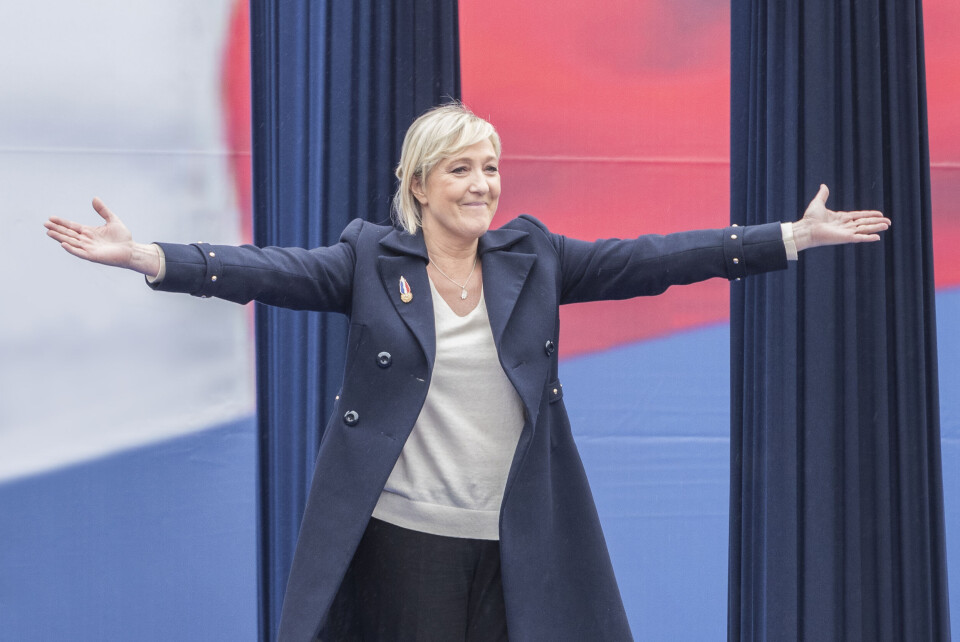-
How many Americans live in Paris - and where else are they choosing in France?
Over a quarter of all US nationals in France live in the capital city
-
Price rises for Netflix in France
The Standard (with ads) and Premium packages are increasing by €24 a year
-
Leclerc supermarkets to sell car fuel at cost price for Easter
The initiative will apply to diesel, petrol, and LPG
What does Le Pen’s strong election result say about France?
Marine Le Pen called the performance a ‘resounding victory’. A French historian disagrees, but admits it poses questions about society and the country’s institutions

A French historian has said that presidential candidate Marine Le Pen’s score of 41.46% in the election yesterday (April 24) marks a big step for the far right and is evidence that the views have become “commonplace” in France.
Nicolas Lebourg, speaking to Franceinfo, said that while a threshold has been crossed, it is not obvious what it means for the future of the country.
He is predicting that Ms Le Pen's party, Rassemblement National (RN), will not get more than 10 MPs in the legislative elections in June – the party got eight in 2017.
This is despite the fact that the party’s candidate “just received 41.46% of the vote in the election”, Mr Lebourg said.
“This will inevitably create tensions again, and it will raise the question of institutions: how do we integrate these voters?”
Marine Le Pen did not win France’s presidential election yesterday (April 24), but she did make big gains in comparison with 2017 and described the results as “a resounding victory”.
The 41.46% of the vote she received came from 13,297,760 votes, which is 7.55 percentage points higher than in 2017 and almost three million more votes.
“This result demonstrates the great defiance of the French people," she said yesterday.
“I do not feel any resentment or rancour.
“To avoid this monopolisation of power by a few, more than ever I will continue my commitment to France and the French.”
Read more: Five takeaways from France’s presidential election second round
Mr Lebourg said that there is no limit to how far the far-right can go in France, but hesitated to say that this year’s result was a “resounding victory” for RN.
“It is clear that the far right is making progress each time,” he said.
“But a ‘resounding victory’, no, we must not exaggerate.
“In 2017, the rumour was that a score of 40% would be seen as a success. In the end, Marine Le Pen was far from it (33.9%).
“Here, that bar has been reached but we cannot say that the progression is enormous.”
He did admit, though, that her campaign focusing on spending power rather than RN’s more traditional key policies of immigration, worked well.
“This is her third presidential election and the first one in which she scored better in the first round than the polls predicted in the autumn. This is the sign of a successful campaign.
“But purchasing power did not fall from the sky.
“Eric Zemmour came to compete with her on immigration, and she fell back on a theme that was the primary concern of the French.”
Mr Zemmour was another far-right candidate who finished fourth in the first round of the elections. He then endorsed Ms Le Pen in the second round, and 73% of his voters switched allegiance to RN’s candidate.
Ms Le Pen managed to use Mr Zemmour’s arrival on the political scene to her benefit, coming across as being less extreme. This helped her to continue a process known as ‘dédiabolisation’, in which RN seeks to distance itself from the more extreme views that surrounded the party in the early days.
Read more: ‘Le Pen’s programme remains far-right despite efforts to soften image’
Mr Lebourg said that it could be that Ms Le Pen has taken this process as far as it will go, and that it has become something of a catch-22 for her party.
“Since the 1980s, surveys have shown that the main reason for voting for the [far right] is national preference [meaning giving preference to French nationals over foreigners],” he said.
“It is also the national preference policy that motivates voters to mobilise against the RN.
“[If Ms Le Pen wants] to go further in softening her image, she would have to give up this idea. But if she does, she loses many of her voters.”
Having two far-right candidates perform so well in the first round raised questions about the prevalence of extreme views in France, a point that Mr Lebourg addressed.
“Paradoxically, polls… show that over the past 20 years there has been an increase in tolerance in France, particularly concerning Islam, and a rejection of antisemitism.
But he said that the election’s high abstention rate, which was 28.01%, the highest rate since 1969, meant the election painted an incomplete picture of French society.
“Because of abstention, we are losing many young people [from the election], whereas these studies show that this demographic are more open to questions related to religion or homosexuality.
“I also see a general tendency in society where people feel much more entitled to express all opinions. In the media, it is much more common to hear far-right speeches.
"Paradoxically, because of this public space where the most hard-line ideas are expressed, we may end up electing a far-right president in an increasingly tolerant country.”
Related articles
Macron wins second term as president: How did your area vote?
President Macron’s re-election win: ‘Now we have so much to do’
Recap: What Emmanuel Macron pledged to change if re-elected president
























